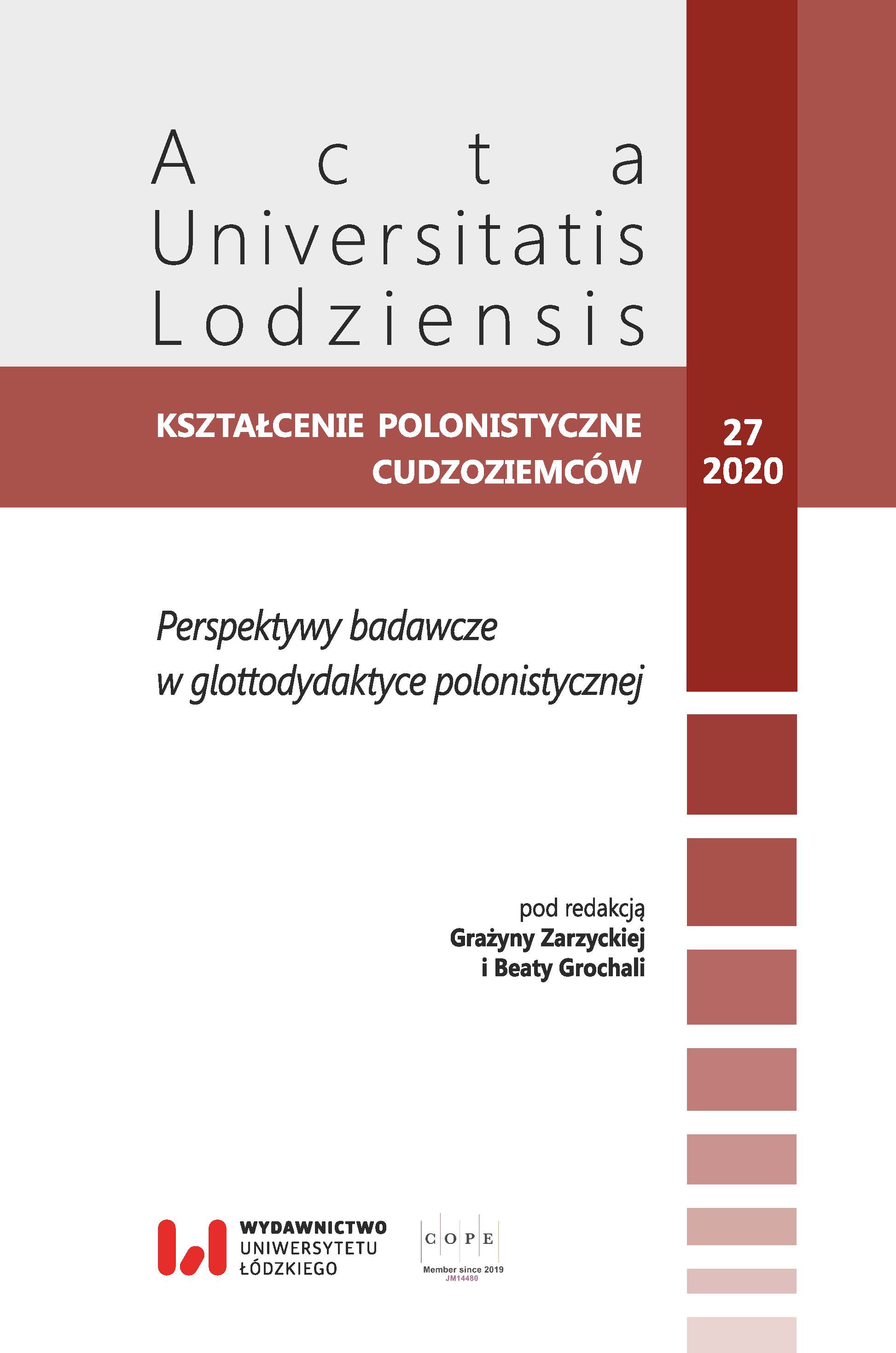On teaching expressing the negative emotions in Polish as a foreign language lesson
DOI:
https://doi.org/10.18778/0860-6587.27.27Keywords:
expressing emotions, negative emotions, emotions in a foreign language, emotions in Polish language, Polish-language glottodidacticsAbstract
The article presents the most important aspects of the issue of emotions and their expressing in Polish as a foreign language and in Polish culture as a foreign culture. The basic assumption adopted in the text is the need of teaching the ways of expressing emotions – including negative ones – in foreign languages and cultures. Learners are not sure whether they can communicate e.g. anger, nervousness or fear in a comprehensible and adequate way without knowledge about the possibilities of communicating psychological experiences. The issue has been set in an interdisciplinary context, taking into account the achievements of authors who perceive emotions in the context of the culture-language relationship. The possibilities of perceiving the issue of emotions in the glottodidactic process have been discussed. Author’s quantitative empirical research on the ability to recognize and express negative emotions by foreigners has also been described. Its results form the basis of the didactic implications formulated in the article. It has been emphasized in the recapitulation of the argument that there is a need to include the issue discussed in the text in the Polish-language glottodidactic process.
References
Barna L.M., 1994, Stumbling Blocks in Intercultural Communication, w: L.A. Samovar, R.E. Porter (red.). Intercultural Communication: A Reader, Belmont, California, s. 337–346.
Google Scholar
Czachur W. (red.), 2017, Lingwistyka kulturowa i międzykulturowa, Warszawa.
Google Scholar
DOI: https://doi.org/10.31338/uw.9788323527381
Ekman P., 1972, Universal and Cultural Differences in Facial Expression and Emotion, w: J.R. Cole (red.). Nebraska Symposium on Motivation, 1971: Cultural Psychology, Lincoln, s. 207–283.
Google Scholar
Ekman P., Friesen W.V., 1971, Constants Across Cultures in the Face and Emotion, „Journal of Personality and Social Psychology”, t. 17, nr 2, s. 124–129.
Google Scholar
DOI: https://doi.org/10.1037/h0030377
ESOKJ – Europejski system opisu kształcenia językowego: uczenie się, nauczanie, ocenianie, 2003, Warszawa.
Google Scholar
Evans V., 2009, Leksykon językoznawstwa kognitywnego, Kraków.
Google Scholar
Freud Z., (1917) 2010, Wstęp do psychoanalizy, Warszawa.
Google Scholar
Grosjean F., 2010, Life and Reality, Cambridge.
Google Scholar
Janowska I., Lipińska E., Rabiej A., Seretny A., Turek P., 2016, Programy nauczania języka polskiego jako obcego. Poziomy A1–C2, Kraków.
Google Scholar
Krashen S.D., 1982, Principles and Practice in Second Language Acquisition, New York.
Google Scholar
DOI: https://doi.org/10.1111/j.1467-971X.1982.tb00476.x
Łątka E., 2012, Czy mówienie o emocjach w języku obcym jest możliwe? O potrzebie rekonstruowania skryptów kulturowych wyrażania emocji dla glottodydaktyków polszczyzny, „Acta Universitatis Lodziensis. Kształcenie Polonistyczne Cudzoziemców”, t. 19, G. Zarzycka (red.), s. 35–43.
Google Scholar
Łątka-Likh E., 2015, Polskie skrypty kulturowe w kontaktach ze wspólnotą innojęzyczną. Zagadnienia metodologiczne, „Poradnik Językowy”, z. 8, s. 101–111.
Google Scholar
Lévi-Strauss C., 1970, Antropologia strukturalna, Warszawa.
Google Scholar
Łosiak W., 2007, Psychologia emocji, Warszawa.
Google Scholar
Łukaszewicz B., 2016, Kilka ostrych słów, czyli co o emocjach negatywnych mówią podręczniki do nauki języka polskiego jako obcego, w: D. Saniewska (red.), Emocje – język – literatura, Kraków, s. 365–382.
Google Scholar
Nagórko A., 2012, Podręczna gramatyka języka polskiego, Warszawa.
Google Scholar
Nowakowska-Kempna I., 1995, Konceptualizacja uczuć w języku polskim: prolegomena, Warszawa
Google Scholar
Opitz B., Degner J., 2012, Emotionality in a Second Language: It’s a Matter of Time, „Neuropsychologia”, t. 50, nr 8, s. 1961–1967.
Google Scholar
DOI: https://doi.org/10.1016/j.neuropsychologia.2012.04.021
Przybylska I., 2006, Inteligencja emocjonalna jako kluczowa kompetencja współczesnego nauczyciela, „Chowanna”, t. 1, s. 85–95.
Google Scholar
Seretny A., 2016, Słownictwo w dydaktyce języka. Świat słów na przykładzie języka polskiego jako obcego, Kraków.
Google Scholar
Shweder R.A., 2012, „Nie jesteś chory, tylko się zakochałeś” – emocja jako system interpretacji, w: P. Ekman, R.J. Davidson (red.), Natura emocji. Podstawowe zagadnienia, Sopot, s. 36–47.
Google Scholar
Turner J.H., Stets J., 2009, Socjologia emocji, Warszawa.
Google Scholar
Wierzbicka A., 1999, Mówienie o emocjach. Semantyka, kultura i poznanie, w: A. Wierzbicka, Język – umysł – kultura, Warszawa, s. 138–162.
Google Scholar
Wierzbicka A., 2001, A Culturally Salient Polish Emotion: Przykro [‘Pshickro], w: J. Harkins, A. Wierzbicka (red.). Emotions in Crosslinguistic Perspective, Berlin–New Jork, s. 337–357.
Google Scholar
Wierzbicka A., 2006, Semantyka. Jednostki elementarne i uniwersalne, Lublin.
Google Scholar
WSJP – Wielki słownik języka polskiego PWN, 2018, praca zbiorowa, Warszawa.
Google Scholar
Zarzycka G., 2019, Kulturemy polskie – punkty widzenia, techniki ich wydobywania i negocjowania. Stosowanie perspektywy etnolingwistycznej w glottodydaktyce polonistycznej, „Acta Universitatis Lodziensis. Kształcenie Polonistyczne Cudzoziemców”, t. 26, G. Zarzycka, B. Grochala, I. Dembowska-Wosik (red.), s. 425–441. https://doi.org/10.18778/0860-6587.26.29
Google Scholar
DOI: https://doi.org/10.18778/0860-6587.26.29
Downloads
Published
How to Cite
Issue
Section
License

This work is licensed under a Creative Commons Attribution-NonCommercial-NoDerivatives 4.0 International License.










